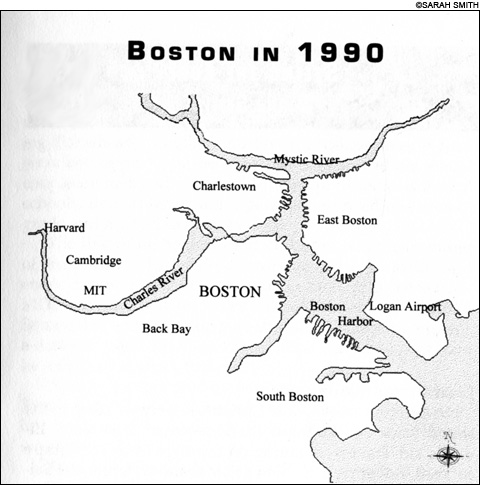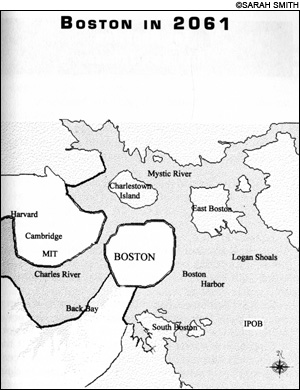
HOW IT ALL BEGAN: Future Boston's antediluvian city map. |
The actual future is a collaboration between nearly seven billion people worldwide. But creating a future can be a fun indoor sport for you and your friends.

AFTER THE FLOOD: Here, in Future Boston, there be aliens ... and a radically altered landscape. |
That's what the Cambridge Science Fiction Workshop did. From 1988 through 1992, we defined and explored a future, then wrote stories set there. Most of them were collected into the mosaic novel
Future Boston (
which you can read more about here).Along the way, we figured out a baker's dozen principles that may come in handy if you want to create your own future.
1. Don't do it alone.
A single author's vision of the future often hides a desired narrative. Your friends will kick that out from under you. The result will be a mess, full of loose ends. Just like the real future.
2. Undertake this only with people you know fairly well, whose capacities you respect, and whose motivations you trust.
Believe us, this is real and challenging work. Like any other collaboration, it can unleash or surface some underlying conflicts, as differing visions vie for supremacy – after all, that's the way the real future is built. So get ready for stress, and learn to manage and resolve it. Before we embarked on the experiment, we'd been a group of published science fiction authors who workshopped each other's prose for years. We knew and trusted each other. We were also competitive, the best way to get good work.
3. Pick a place or company or social group you know something about and focus on it—creating even a small part of the future is a tall order.
Creating within constraints brings tension you can harness. We chose Boston, a geographic notion. We all lived in the area, some of us natives, some of us long-ago transplants. We liked living here, we liked its history, and we wanted to extend Boston's past and present identity into its future. Of course the outside world, and even the rest of the universe, broke in on us, but we observed it and experienced it locally: every Future Boston story is set primarily in Boston itself. Boston was our yardstick and our lens. Alex had a friend who had studied at the Episcopal Divinity School, in Cambridge, and so put an alien murder there.
4. Agree on a few long-wave trends that carry throughout your era, reasonable things that could plausibly come to pass. Part of our anchoring of stories is by visible externals – cars, clothes, phones, music. What will the future hold? Smaller smarter gadgets. Economic change. Bigger servings of food. Greater global interactivity. Some things you know are coming, so make them your baseline. We accepted continually increasing immigration, and a long economic boom punctuated by a few big busts.
5. Match big things with small ones — the future happens to individuals, and manifests itself in their daily lives.
Headline events grab our attention, but lack reality in a localized world unless they affect people as they get through their day. Stories need cups of coffee, lost wallets, late school assignments, car accidents, and evenings reading to sleepy children. David's "Dying in Hull" is exactly that—one person, Ethel Cobb, trying to get through her day in a dying town she loves and understands and others do not.